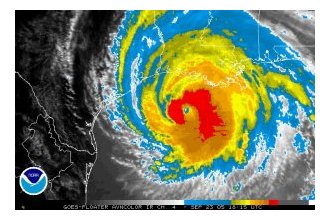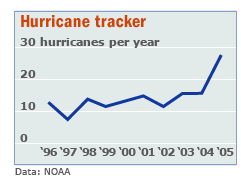| |
One More Hole in the Housing Bubble: Insurance
(June 15, 2006)
 A recent entry on the housing bubble and jobs drew an
insightful commentary from a knowledgeable reader on yet another gaping hole in
the deflating housing bubble: insurance.
A recent entry on the housing bubble and jobs drew an
insightful commentary from a knowledgeable reader on yet another gaping hole in
the deflating housing bubble: insurance.
To put this reader's comments in context, let's start with this story from Florida:
Insurance premiums force tough choices:
WEST PALM BEACH — Tracy Casper felt ill Mother's Day weekend.
While plenty of people will remember opening sentimental cards, Casper remembers opening
her windstorm insurance renewal notice. Her premium had skyrocketed 194 percent to $7,443.
Casper and her husband, Joseph Gushanas, don't live in an extravagant mansion on the water.
They bought their 2,800-square-foot West Palm Beach home east of Interstate 95 almost 10
years ago for $165,000.
Insurance companies aren't just raising rates--they're leaving hurricane-prone states
or cancelling policies en masse, and have been doing so in Florida for years:
Home insurance rates pressure real estate:
Insurance Journal reported that four small Florida insurance companies are in the process
of canceling 9,000 policies in the state and Penn Charter, which had about 6,300 home
insurance policies in Florida, is pulling out of Florida market. The journal also reported
that Citizens Property Insurance Corp., a state-run entity formed in 2002 as an insurer of
last resort for those who cannot find adequate insurance coverage in the private market,
this year plans to raise its windstorm insurance rates by as much 117 percent for some
homeowners.
USA Today has this report of
500,000 cancelled homeowners' policies:
In the widest insurance retreat from coastal property since Hurricane Andrew slammed Florida
in 1992, insurers as far north as Long Island, N.Y., and Cape Cod, Mass., are shedding
coastal homeowners policies to reduce their exposure.
 In Florida alone, insurers that are undercapitalized or fearful of losses have notified the
state of plans to cancel more than 500,000 homeowners policies. With $2 trillion each in
coastal property, Florida and New York lead the USA in coastal exposure, followed by Texas
and Massachusetts.
In Florida alone, insurers that are undercapitalized or fearful of losses have notified the
state of plans to cancel more than 500,000 homeowners policies. With $2 trillion each in
coastal property, Florida and New York lead the USA in coastal exposure, followed by Texas
and Massachusetts.
Companies including Allstate, the USA's second-biggest property insurer, say forecasts of
more major hurricanes combined with soaring coastal real estate development have created
unacceptable risk in some areas.
Last year's hurricanes cost insurers a record $60 billion in claims payouts. Now Allstate,
which paid out a record $5 billion in hurricane claims last year, is canceling 95,000
policies in Florida and 28,000 in New York.
Do skyrocketing insurance rates, high deductibles or simply being uninsured have any
impact on the value of homes? Here's our reader's observations: (emphasis added)
Though not yet widely publicized, there is increasing evidence that the major insurance
providers are rapidly reducing their risk profiles by dropping insurance coverage for
hurricanes and earthquakes. (see above stories)
Even if some coverage remains available from smaller
players, at a minimum the premiums would rise substantially as would the possibility of
default in a Katrina style disaster, and there is the potential at worst for no coverage
to be available. Catastrophic insurance at a reasonable cost has historically reduced the
risk premium for owning real estate on both coasts, which happens to be where the housing
bubble is most prominent. Should homeowners in these regions be no longer able to obtain
coverage, the implications are significant in terms of the re-pricing of house values that
would be needed to accommodate the new risk premium.
This would be the case even if there was no bubble in these regions!
Once potential buyers realize they can't get coverage on
massively over valued properties, the potential for a demand side shock could be significant
to say the least. It also would change seller's psychology to discount in order to get out
of these properties, something they historically are slow to do, perhaps accelerating the
process of price declines beyond that which typically occurs.
Our reader added some acutely astute comments on even wider implications for our economy:
 Interestingly, if only a fraction of homes are covered even when coverage is available (i.e.,
if people can't afford it which in fact may be the case), the mis-pricing of homes in
hurricane regions still would be significant. That is because for the last decade we have
been in the benign part of a longer term hurricane cycle which has lowered the risk premium.
Katrina was the wake up call (along with new models and predictions from the meteorological
experts) that this is no longer the case. So the coming decade-long increase in the frequency
and severity of hurricanes, the widespread lack of insurance, the new unavailability of
insurance, and the overpricing of homes in hurricane prone regions may all conspire to
adjust that mis-pricing.
Interestingly, if only a fraction of homes are covered even when coverage is available (i.e.,
if people can't afford it which in fact may be the case), the mis-pricing of homes in
hurricane regions still would be significant. That is because for the last decade we have
been in the benign part of a longer term hurricane cycle which has lowered the risk premium.
Katrina was the wake up call (along with new models and predictions from the meteorological
experts) that this is no longer the case. So the coming decade-long increase in the frequency
and severity of hurricanes, the widespread lack of insurance, the new unavailability of
insurance, and the overpricing of homes in hurricane prone regions may all conspire to
adjust that mis-pricing.
A related issue which borders on political commentary is why are so many households in these
regions uninsured and what does that say about our society? In part it's because the cycle
has been benign recently. In part it's because it's human nature that "it couldn't happen to
me". In part, it's because with housing prices rising so rapidly people are more willing to
take the risk (or they intended to flip rather than hold long term).
But most importantly,
it's because our society has created a culture that feels it is our government's
responsibility to bail us out of every disaster and that we have no personal responsibility
for our own decisions and actions. This bail out mentality, in my opinion, is very
dangerous and counter productive to our society. Some recent examples are the "Greenspan put"
which fostered the equity market bubble, Greenspan's deliverance on that put following the
equity bust that created the current real estate bubble, and Katrina itself with the cries
by many for the government to fully subsidize rebuilding in the same hurricane prone regions.
Declines in economies come from misallocation of capital which are prolonged and not
corrected because this ultimately steals the life blood from truly productive ventures.
As an aside, the whole real estate bubble is a great example of this - by "investing" in
real estate rather than innovation, people are actually diverting resources to non-productive
assets. It's a mirage (actually it's a ponzi scheme). Even though at first it looks like is
might increase your wealth and standard of living, that is likely to be temporary and in
the long term a house is just a depreciating asset (100 year old decaying inner city ghettos
and dilapidated country mansions were once held in high esteem as valuable luxury residences).
Getting back to bail out mentality - when that becomes entrenched, people make bad
(speculative) decisions. In my view, people just shouldn't build excessively in disaster
prone regions unless they have the insurance or resources to "weather the storms". The
cost to us as a society and to our economy is just too great and takes away massively from
better and more productive uses of that capital. We are making poor decisions today which
is not just short changing ourselves but in the long term the standard of living of our
children and their descendants.
It is difficult to plausibly dispute that the housing bubble has been a vast
misallocation of capital, or that we have entered a new mega-cycle of increasing storm
activity. The implications of these two factors will weigh not just upon coastal housing
but on mortgage and insurance rates--and thus on housing values--nationwide.
For more on this subject and a wide array of other topics, please visit
my weblog.
copyright © 2006 Charles Hugh Smith. All rights reserved in all media.
I would be honored if you linked this wEssay to your site, or printed a copy for your own use.
|
|


 A recent entry on the housing bubble and jobs drew an
insightful commentary from a knowledgeable reader on yet another gaping hole in
the deflating housing bubble: insurance.
A recent entry on the housing bubble and jobs drew an
insightful commentary from a knowledgeable reader on yet another gaping hole in
the deflating housing bubble: insurance.